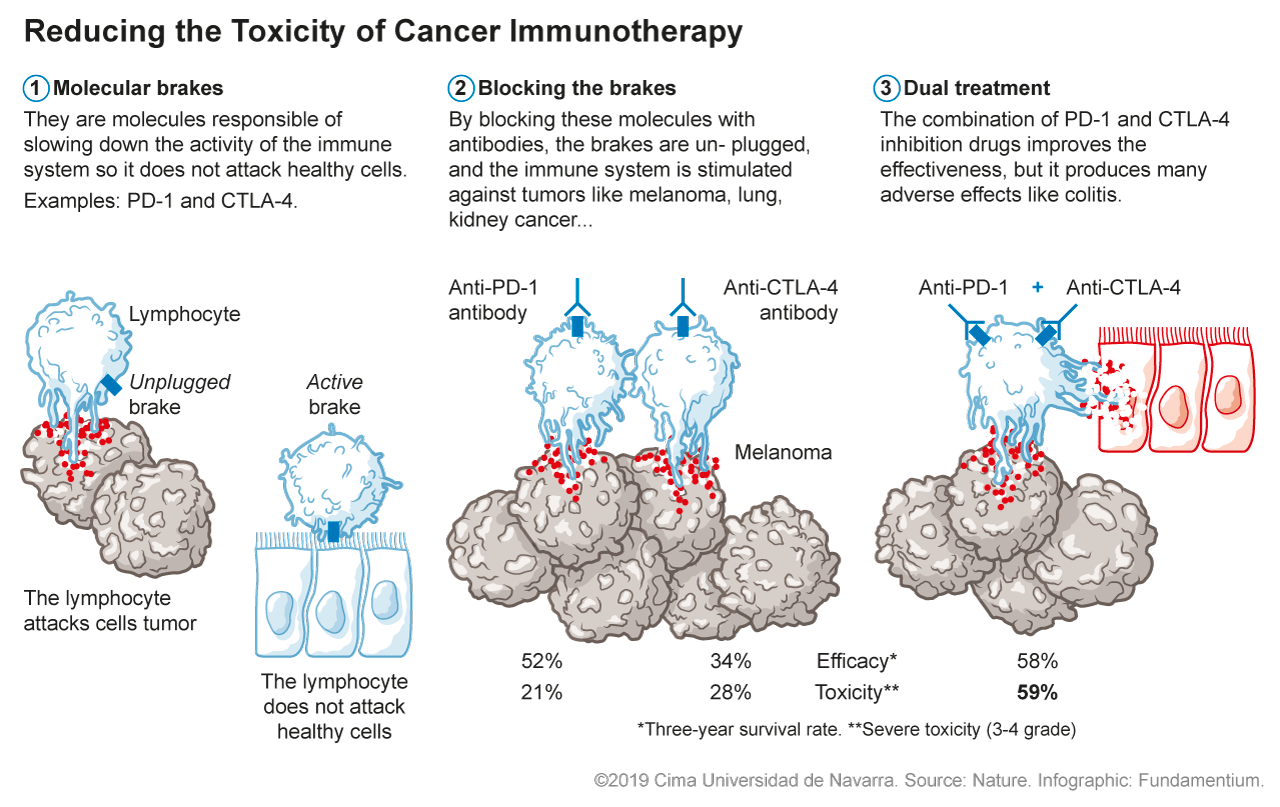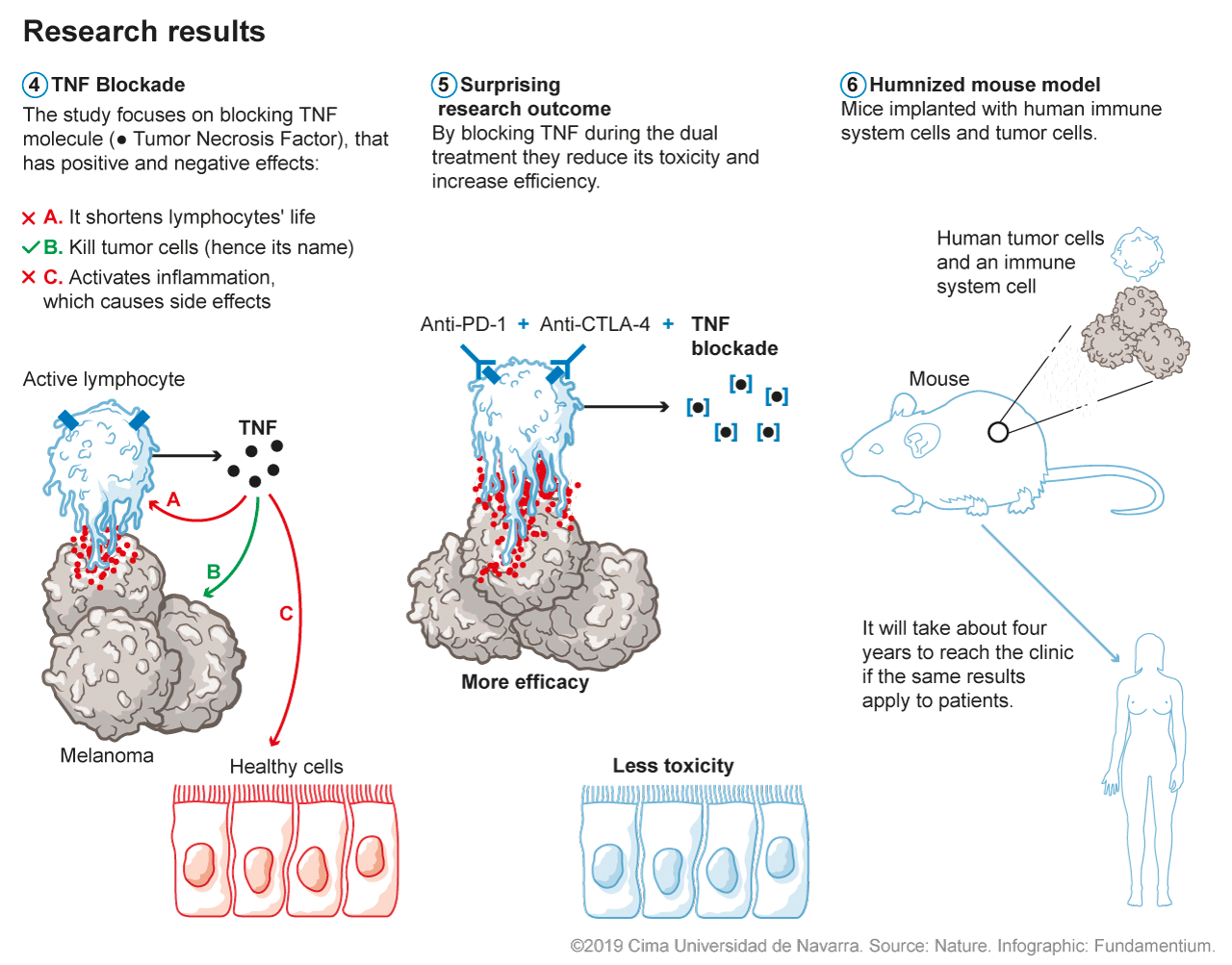Pretreatment with TNF inhibitors may improve outcomes of combination cancer immunotherapy based on animal models
A collaborative experimental study, published in Nature and led by researchers at the University of Navarra, suggests TNF blockade may dissociate efficacy and toxicity in the use of combined immunotherapy

A collaborative experimental study, led by researchers at Cima and Clínica Universidad de Navarra, proposes a new therapeutic approach against cancer that dissociates efficacy and toxicity in the use of combined immunotherapy in animal models. This clinical strategy consists of blocking a protein involved in the regulation of the immune system (called tumor necrosis factor, TNF) while applying combination immunotherapy treatment (inhibition therapy of PD-1 and CTLA-4, other proteins that "slow down" the immune response). Nature, the leading international weekly journal of science, publishes this research in its latest issue.
"In this study, we have identified that the immunoregulatory function of TNF is dispensable and, to a certain extent, harmful to the antitumor activity of this combined immunotherapy," explains Dr. Ignacio Melero, senior researcher at Cima and co-director of the Department of Immunology at Clínica Universidad de Navarra. "We have verified that the prophylactic blocking of TNF before applying immunotherapy avoids adverse effects and improves the response to treatment in these animal models. This allows us to adjust the doses of the medication better and thus achieve a more robust anti-tumor efficacy, "adds Dr. Pedro Berraondo, a researcher at Cima. Dr. Elisabeth Pérez Ruiz, from Hospital Costa del Sol and first author of the work, highlights the usefulness of this approach "since in prevention context it means using what we already use in routine practice to treat the autoimmune adverse effects."
The next step pointed out by the experts, is to transfer this research to the clinic. According to Dr. Melero, "if we obtain the results of this study in patients, it will change the paradigm for treating cancer. However, despite these promising results in animal models, we must be very cautious about their interpretation, because we don't know with certainty if they will be reproduced in the patients that are included in the ongoing clinical trials or in those that are going to start soon."
Novelty in anti-TNF treatmentResearch in cancer treatment seeks to extend the benefits of immunotherapy to a more significant number of patients. The latest advances in this field consist of uniting several of these treatments. Among them, "the combination of PD-1 and CTLA-4 inhibition drugs achieves remarkable efficacy against the most aggressive skin cancer (melanoma), kidney and lung cancer. However, 40% of patients suffer serious side effects," says Dr. Melero. “That is precisely why preventing them as achieved in this study is so important for the success of this combined immunotherapy,” adds the expert.
PD-1 and CTLA-4 are a type of immune cells proteins (the T lymphocytes) responsible for preventing these cells from destroying other cells, such as cancer cells. Thus, they act as "brakes" in the control of the immune system. By inhibiting these molecules, the "brakes" are unplugged, and the defenses of the organism are stimulated.
The tumor necrosis factor (TNF) serves to mediate inflammation, induce the destruction of some tumor cells, and activate the white blood cells, the cells of the immune system. The blocking of this protein in immunotherapy is not new, but its prophylactic application in this anti-PD-1 and anti-CTLA-4 therapy is.
"The clinical evidence is modest, but points to an excellent safety of TNF inhibition in advanced cancer patients," says Dr. Berraondo. "Our results in the laboratory along with previous clinical experience suggest conducting a clinical trial to test the safety and efficacy of this combined immunotherapy treatment. In fact, we are evaluating a potential clinical trial protocol to study the effect of prophylactic TNF blockade upon treatment with nivolumab (anti-PD-1) andipilimumab (anti-CTLA-4) in humans,” adds the expert.
This research has been supported by the International Immuno-Oncology Network, a global peer-to-peer collaboration formed by Bristol-Myers Squibb; the Spanish association against cancer (AECC), various European funds and other financial grants such as the aids from “la Caixa”. In addition to Cima and the Clínica Universidad de Navarra, researchers from several institutes collaborated. They were part of the Centro de Investigación Biomédica en Red de Cáncer (CIBERONC), the Hospital General Universitario Gregorio Marañón, the Hospital Costa del Sol, the Hospital Universitario Virgen de la Victoria, the Navarra Institute for Health Research (IDISNA), the Instituto de Investigación Biomédica de Málaga (IBIMA), the Centro de Investigaciones Médico-Sanitarias (CIMES) y Universidad de Málaga.
-
Bibliographic reference
Prophylactic TNF blockade uncouples efficacy and toxicity in dual CTLA-4 and PD-1 immunotherapy
DOI: 10.1038/s41586-019-1162-y


